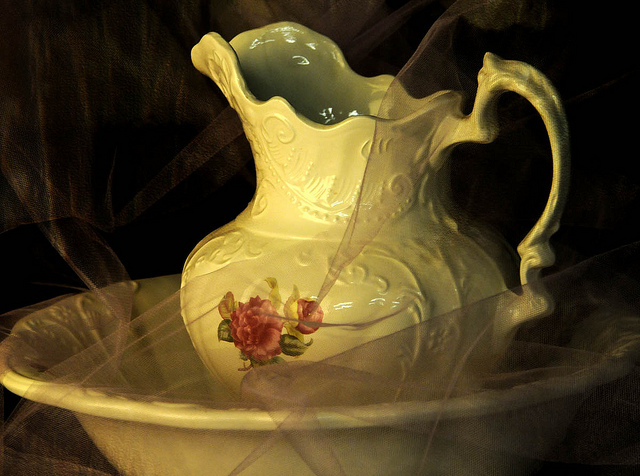FWP:
SETS == POETRY; WORDPLAY
Arshi dates this ghazal to 1838; as Mihr points out, that's before Ghalib had a formal relationship with the Red Fort. But of course it's after his return from Calcutta-- a time in his life when he was in dire straits financially and was casting about everywhere for a reliable patron. Was Ghalib attempting to flatter Bahadur Shah, who had just come to the throne? The previous king, Akbar Shah II (r.1806-37), was also himself a poet, so even if the ghazal could be dated a bit earlier, it could still perhaps be such an effort at flattery.
In any case, on this reading the flattery contains more than a little ambiguity. After all, the 'Khusrau' who is linked with Shirin had all sorts of problems, because his fickle, vain, impulsive temperament often got him in over his head. To be linked to him rather than to Farhad can be a compliment perhaps to one's kingship or good fortune, but certainly not to one's poetry. (Here is Nizami's version of the story, with discussion: Peter Chelkowski et al, 1975: pp. 21-48.) For an even more equivocal verse of 'praise' for the King, see {120,12}.
Mihr proposes another reading: that Ghalib is thinking of Amir Khusrau (1253-1325), the famous Indo-Persian poet, and claiming him as an admired model or source of inspiration. An anecdote from Siyar ul-Auliya (1302), by Muhammad Mubarak Kirmani Amir Khurd (Lahore: Markaz-e Tahqiqat-e Farsi-e Iran o Pakistan, Mu'assasah-e Intisharat-e Islami, 1978, pp. 311-12), provides strong ammunition for Mihr's reading. The anecdote is that one day Khusrau recited verse praising Hazrat Nizamuddin, who as a reward asked him what he wished for. He said he wanted sweetness of speech/poetry [shiiriinii-e su;xan]. Hazrat Nizamuddin directed him to bring out a container of sugar from under the cot, and to pour some over his head, and to eat some. As a result he acquired sweetness of speech/poetry, and universal fame.
I thank Zia Inayat-Khan and Mat Ansari for suggesting and locating this material. Sweetness of poetry, and a sense of pouring sugar over one's head and thus 'bathing' in sugar, works well with the image of the washing of Khusrau's feet. On this reading, the verse might suggest that Ghalib too has had his poetry sweetened not just by Khusrau's influence, but by the sugar-bath blessing, the barakat , of Hazrat Nizamuddin himself.
As for Ghalib's reference to Khusrau in the letter cited above, the context makes it clear that he refers to authoritativeness of Persian usage, not necessarily poetic excellence. Faruqi, referring to that letter, points out that it is in fact no Indo-Persian poet at all but rather Urfi who is, for Ghalib, 'the obeyed one; we are his obeyers and followers' (Khaliq Anjum vol. 4, p. 1543). For more on this, see Faruqi, 'A Stranger in the City', especially p. 38.
But after all, in order for Ghalib to intend a reference to Amir Khusrau as one possible reading of this verse, he doesn't have to admire Khusrau the way he admires, say, Bedil. He just has to admire him in general-- as he clearly does-- and also relish the excellent multiple wordplay of a (real-life) king, a (literary) king, and a famous ancestral poet, all evoked and forced to rub shoulders within a few words of his own (bitter-)sweetness of speech.
I had written this much when I heard from S. R. Faruqi on the subject. He authorizes me to put his email (March 24, 2004) online:
Here the reference cannot be to the poet Khusrau. It is extremely improbable, not to say inappropriate, to pay a tribute to a dead person in these terms. Washing someone's feet and drinking the wash water has an immediacy and a physicality that can never apply to a dead person. Mihr... says that this ghazal appears in the 1841 divan, & Ghalib's employment at Court dates from a decade later, so the verse could not have been about the King. Ghalib wasn't a servant of the King in 1841 so why should he...etc., etc.
Well, the King was the most important cultural & iconic personage in Delhi and it was quite proper for poets to pay tributes to him even if they weren't directly employed at court. Kali Das Gupta Riza dates this ghazal to sometime after 1838. I think we can be a bit more specific than this. Bahadur Shah ascended the throne in the early morning of 30 September, 1837. It is possible that there was a musha'ira or some such gathering soon after the King's ascension, maybe even to celebrate the event. So what more appropriate than to insert a nice, apposite verse about the King, about his literary status, and about the fact that the benefit of his personality and presence extends to all and sundry?
There's a manuscript selection of Ghalib's, dated 1838-1839. The ghazal's first appearance is in that selection. So we can assume that Ghalib wrote the ghazal sometime early in 1838 and the occasion for the Khusrau verse would have been Bahadur Shah's ascension.
I'm out of my depth here, since I don't really have a
good sense of the Indo-Muslim cultural etiquette of foot-washing and wash-water-drinking.
So you, dear reader, can make your own best guess.

Ghalib:
[1865, to Taftah:] Of the people of India, except for Khusrau Dihlavi there's no one truly authoritative [musallam ul-;subuut]. Even Miyan Faizi slips up occasionally. And the dictionary-makers work at a level of guessing-- whatever each of them in his own opinion considers correct, he writes. If dictionaries had been written by Nizami and Sa'idi, etc., then we would accept them. How can we consider Indians [hindii] truly authoritative?!
==Urdu text: Khaliq Anjum vol. 1, p. 352